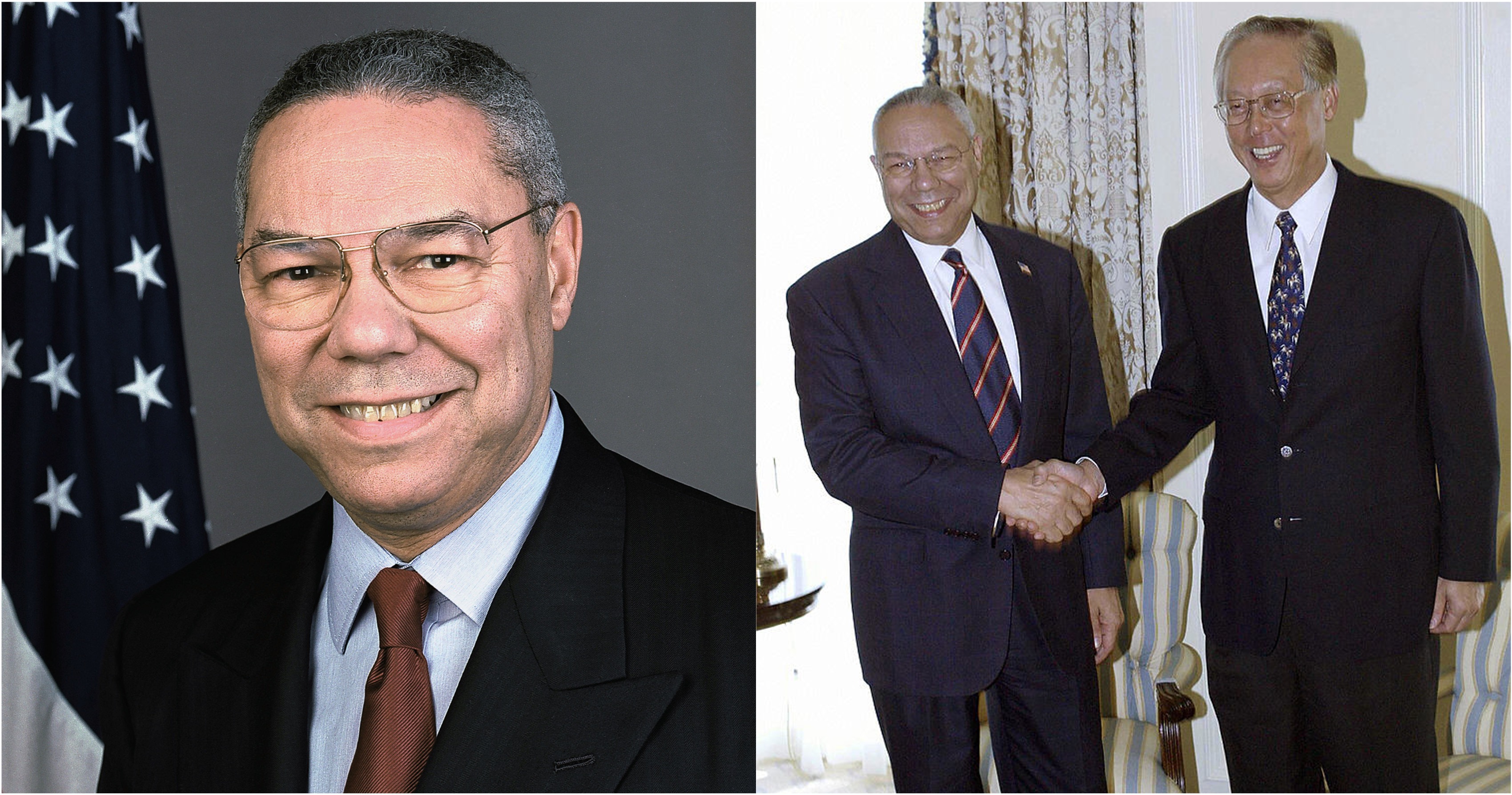Follow us on Telegram for the latest updates: https://t.me/mothershipsg
Colin Powell, former U.S. Secretary of State and Chairman of the Joint Chiefs of Staff, and the first African-American to serve in both positions, died on Monday, Oct. 18.
He was 84.
Powell died from Covid-19 complications.
According to CNN, Powell's family noted he was fully vaccinated, but he also had multiple myeloma, a form of cancer that suppresses the body's immune response, and Parkinson's Disease.
People with underlying conditions and who are immunocompromised are at greater risk from the virus.
Military background
Powell was born in Harlem, New York City to Jamaican immigrant parents.
He joined the army at a young age and was commissioned as an officer.
Powell served two tours in the Vietnam War, and survived a helicopter crash, going back into the burning wreckage to rescue three other men, including his commanding general at the time.
After reaching the rank of Lieutenant General, Powell was named National Security Advisor to President Ronald Reagan, while still retaining his commission in the army.
He was then promoted to four-star general, and named by Reagan's successor, President George H.W. Bush to the position of Chairman of the Joint Chiefs of Staff (similar to the position of Chief of Defence Force in Singapore).
He was the youngest person ever to serve in the role.
The Powell Doctrine
Powell's tenure as Chairman saw the formulation of the journalist-named "Powell Doctrine", which meant that the U.S. needed a clear military objective and had to hit the enemy with overwhelming force before going to war.
The first President Bush arguably stuck to the doctrine during the first Gulf War in the early 1990s, driving Saddam Hussein's Iraqi forces out of Kuwait, but not toppling Hussein himself.
During the administration of President Bill Clinton, Powell was touted as a potential presidential candidate for the Republican party in 1996, but declined to enter the race.
He broke new ground as the first African-American Secretary of State under the next president, George W. Bush, becoming the fifth-highest ranking person in the federal government.
Visited Singapore
As Secretary, Powell visited Singapore in July 2002, meeting with then-Prime Minister Goh Chok Tong.
A moderating influence in hawkish circles
The Washington Post characterised Powell's tenure as Secretary as being the moderating influence over Bush's more hardline Cabinet members, like Vice President Dick Cheney and Defense Secretary Donald Rumsfeld.
"Throughout 2002, Gen. Powell continued trying to slow the march to war with Iraq, warning Bush in a meeting in August that an invasion could destabilise the Middle East and shackle the United States with a great reconstruction burden.
“You break it, you own it,” he recalled saying."
Made to present case for war
However, Powell agreed to present the Bush Administration's case for war with Iraq in the United Nations in 2003.
Bush junior picked Powell specifically to speak because he was the most reluctant to go to war.
Powell argued that Iraq possessed chemical, biological and possible nuclear weapons, which proved embarrassing as no such weapons were discovered after the American invasion.
"It was painful. It's painful now," Powell said, looking back at his speech in 2005, according to the BBC.
His speech, however, was credited for turning public opinion as it was convincing.
The Iraq War would see Saddam Hussein ousted, but at the cost of at least 100,000 Iraqi lives and thousands of American deaths.
A higher estimate of the death toll puts the total tally of lives lost at close to half a million.
Endorsed Obama
The backlash from the war, among other things, contributed to the rise of Barack Obama, who opposed the invasion before his presidential campaign in 2008.
Powell broke with his party to endorse the Democratic candidate Obama for the 2008 election, notably speaking out against the worrying trend of Islamophobia seen in the campaign.
He said then in response to questions about Obama's faith:
"The correct answer is, he is not a Muslim; he's a Christian. But the really right answer is, ‘What if he is?’ Is there something wrong with being a Muslim in this country? The answer's no, that's not America. Is there something wrong with some seven-year-old Muslim-American kid believing that he or she could be president?"
Did not endorse Trump
Colin Powell was also not reticent in criticising the Republican Donald Trump, in particular his calls to use military force against U.S. civilian protesters, and called him a "habitual liar".
Powell endorsed Joe Biden for the presidency in the 2020 election.
Following the Jan. 6 insurrection by Trump supporters at the U.S. Capitol, Powell said he no longer considered himself a Republican.
Tributes
Many political statesmen paid tribute to Powell following the news of his death, including current Secretary of Defense Lloyd Austin and Secretary of State Antony Blinken.
President Joe Biden also paid tribute to Powell, calling him a "dear friend" and "one of our great Americans".
Jill and I are deeply saddened by the passing of our dear friend and a patriot of unmatched honor and dignity, General Colin Powell. Time and again, he put country before self, before party, before all else—in uniform and out. He will be remembered as one of our great Americans.
— President Biden (@POTUS) October 18, 2021
Former presidents Obama and Bush also saluted Powell's military and public service, calling him an "exemplary patriot".
Powell also left his mark on popular culture.
In the Max Brooks novel "World War Z", the inspiration for the blockbuster movie starring Brad Pitt, Powell is heavily hinted to be the unnamed U.S. president who rallies the world in fighting back against the zombie invasion.
Top image from Getty Images and Facebook.
Follow and listen to our podcast here
If you like what you read, follow us on Facebook, Instagram, Twitter and Telegram to get the latest updates.
